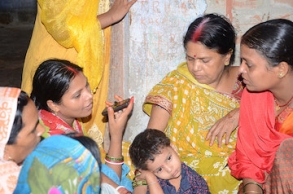As we begin 2019, we are delighted to also share that Gram Vaani has completed ten years of operations! It has been a long journey, from university technology labs to now having worked with over 150 partners across several countries and millions of users, with tremendous learning for all of us, many successes and failures, and it is indeed junctures like this that have us take a pause and reflect.
We started with building technologies for community media that could lead to social development, and indeed we have seen all this working to achieve strong impact. Last year, we wrote to you about what we learnt from our work to build gender equitable and healthy societies by using ICTs, and our various collaborations to enhance access to and resilience in livelihoods for people in rural or semi-urban India. This update is about what we do to help people access their rights and how simple, low-cost community media – supported by offline means – can be critical in connecting people with safety nets and essential services.
We tell you about how our Mobile Vaani networks inform people about government policies and enable them to learn from each other to be able to access their entitlements.
We show examples of how community media networks can help monitor the performance of different schemes and services, and bring accountability towards improved public services delivery and grievance redressal.
We emphasize the role that social workers play in helping the poor get access to their entitlements, and how technology alone is inadequate to guarantee that citizens will be able to access their rights.
The same principles of media that help improve awareness among people and impose checks and balances on power structures, are relevant even in the space of industrial workers. We tell you about our platform in Delhi NCR for migrant workers in the garment sector and other industries, and our work with the TTCU, GAFWU, and PTS women trade unions in South India, to improve working conditions and facilitate action against violations.
ICT4D: Impactful, but still limited
All these projects have produced tremendous impact, as have other projects we have shared with you earlier. And we are not alone – many other fantastic organizations have applied technology in very innovative ways to bring social change. Yet so much remains the same. Problems of gender equity, exploitation of the poor, growing inequality, etc., continue to persist. Technology for development programmes operate within this fabric with an aim to change it, but often find it hard to scale their impact or distribute the impact progressively, while the same underlying technologies are appropriated more effectively by the privileged and increase inequalities even further.
All this only strengthens our resolve that we need to do more to utilize new technologies and enable the poor and marginalized to use them very effectively, that the social impact sector needs to do more by diverting more capital towards development and equality, the state needs to be more realistic in its assumptions of what technology can really achieve and where it needs to be supplemented with human development, and society needs to get more serious at bridging the growing gap between the haves and have-nots.
What’s new in Mobile Vaani
With that note, we are excited to announce that Mobile Vaani is now available on an app, and we are in the process of integrating exciting speech technologies to be able to scale and automate the operations more easily. We are also venturing in a new direction of aiding data collection for community health workers through an AI-based optical scanning technology that will enable real-time data collection and intelligent decision making for local planning.
We are also actively writing about our learning in using technology for development, and what needs to be done in a better way. Check out some of the latest papers and writings by our team on enabling local communities to build sustainable networks to utilize technology, why technology adoption among rural women needs to be encouraged patiently, the importance of social workers to help the poor utilize government schemes, how community media can hold employers to account when the government fails, views on the anti-migrant violence in Gujarat collected by our users, and how responsible outcomes can be ensured from the use of technology.
Several of our projects have also been mentioned in the media, of bringing legal aid to Indian garment workers, rural voices to the fore, protection of children from abuse, and about Main Kuch Bhi Kar Sakti Hoon on the use of Mobile Vaani to create engagement around the TV serial, now headed into its third season starting from Jan 26th 2019
Below are our recent initiatives to help people access their rights and how community media, together with offline means can connect people with safety nets and essential services. We look forward to your support in continuing, strengthening, learning and sharing more about these initiatives. Please write to us at contact@gramvaani.org if you’d like to know more about any of these programs or explore areas of collaboration.
Building awareness of policies and public services, and strengthening accountability


Creating systems for addressing grievances


Engaging with workers & their employers towards meeting workers’ rights





